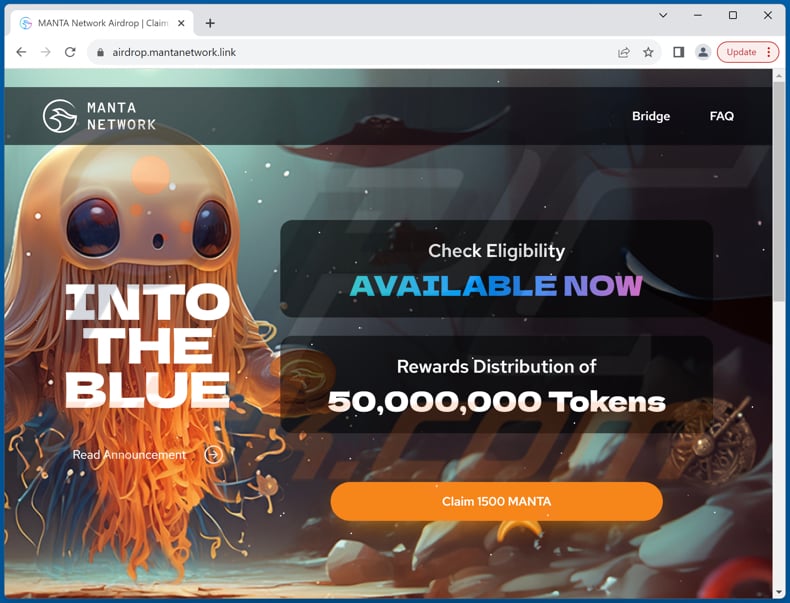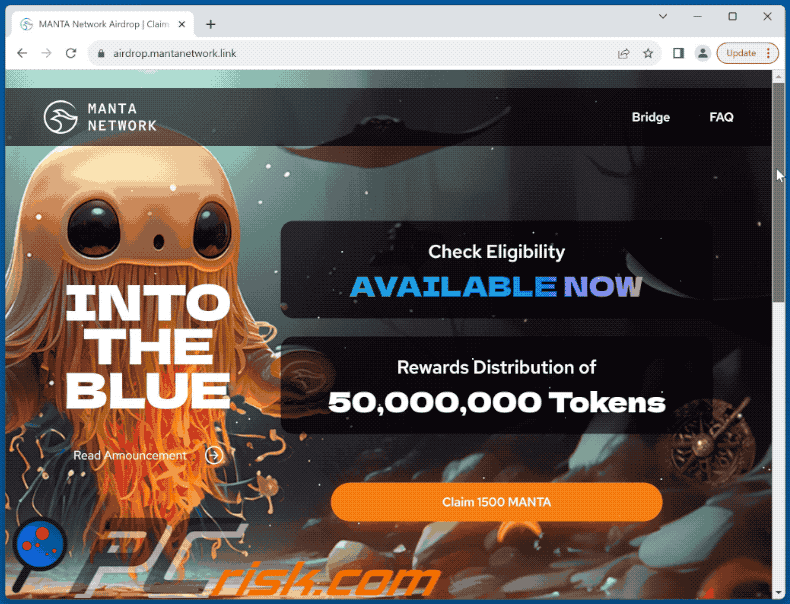How to identify fraudulent schemes like "Claim Manta"
Phishing/ScamAlso Known As: Claim Manta fake giveway
Get free scan and check if your device is infected.
Remove it nowTo use full-featured product, you have to purchase a license for Combo Cleaner. Seven days free trial available. Combo Cleaner is owned and operated by RCS LT, the parent company of PCRisk.com.
What is "Claim Manta"?
Upon reviewing the webpage, we concluded that it is a fraudulent scheme masquerading as a cryptocurrency giveaway (airdrop). The scammers perpetrating the scam intend to deceive unsuspecting users into taking specific actions, ultimately leading to the depletion of their cryptocurrency funds.

"Claim Manta" scam in detail
This scam is promoted via posts on X (formerly Twitter) written using stolen or fake accounts. Clicking the link provided in those posts leads to a deceptive website hosting a fake MANTA giveaway. On this site, a scheme is outlined, stating that individuals acting as referrals stand to earn a 30% commission in BB or ETH, as well as MANTA, from both claiming and purchasing during the presale.
Additionally, those who refer friends will receive a 10% commission from the swap fee if their referral friend engages in a Swap Airdrop. The site also provides an option to claim MANTA. This scam aims to deceive individuals by leading them to believe they need to connect their wallets, ultimately tricking them into approving a malicious contract.
Upon approving a malicious contract, a drainer is activated, which transfers crypto funds from the victim's wallet to the one controlled by scammers. Thus, individuals who fall for this scam lose all their cryptocurrency stored in the compromised wallet. Unfortunately, recovering stolen cryptocurrency is nearly impossible due to the irreversible nature of transactions.
| Name | Claim Manta fake giveway |
| Threat Type | Phishing, Scam, Social Engineering, Fraud |
| Fake Claim | Individuals can receive free cryptocurrency |
| Disguise | Legitimate MANTA giveaway (airdrop) |
| Related Domain | airdrop.mantanetwork[.]link, airdrop.manta-l2[.]io, mnt-ntwrk[.]org |
| Detection Names | Avira (Phishing), Combo Cleaner (Phishing), Emsisoft (Phishing), Kaspersky (Phishing), Sophos (Malware), Full List Of Detections (VirusTotal) |
| Symptoms | Lack of official verification, unrealistic claims, too good-to-be-true promises. |
| Distribution methods | Social media, rogue online pop-up ads, potentially unwanted applications. |
| Damage | Loss of sensitive private information, monetary loss, identity theft, possible malware infections. |
| Malware Removal (Windows) |
To eliminate possible malware infections, scan your computer with legitimate antivirus software. Our security researchers recommend using Combo Cleaner. Download Combo CleanerTo use full-featured product, you have to purchase a license for Combo Cleaner. 7 days free trial available. Combo Cleaner is owned and operated by RCS LT, the parent company of PCRisk.com. |
Conclusion
In conclusion, the outlined scam operates with the deceptive intention of manipulating individuals into approving a malicious contract under the guise of necessary steps to connect their wallets. The intricate web of pseudonymity, irreversible transactions, and the decentralized nature of cryptocurrencies makes the recovery of stolen funds an arduous task.
As users navigate the evolving landscape of digital assets, awareness and vigilance are paramount to avoiding falling victim to such scams, underscoring the importance of proactive measures to safeguard one's cryptocurrency holdings.
More examples of scams employing cryptocurrency drainers are "FTX Customer Claims", "Cointelegraph's 10th Anniversary Airdrop", and "De.Fi Launchpad Airdrop".
How did I open a scam website?
Users might inadvertently encounter fraudulent websites via phishing emails containing malicious links that, when clicked, redirect users to fake websites. Additionally, misleading advertisements on shady sites or social media and notifications from untrustworthy pages can lead to these deceitful online destinations.
It is worth noting that scammers behind fake giveaways frequently take advantage of compromised or fake accounts on popular platforms to disseminate misleading links. Additionally, users can land on scams via pages that utilize rogue advertising networks, commonly used by illegal movie streaming pages, torrent sites, and similar websites.
How to avoid visiting scam pages?
Always scrutinize URLs, ensuring they match the legitimate website's address. Avoid clicking on unsolicited links within emails or messages, and be cautious with pop-up ads on dubious websites. Install reputable antivirus and anti-malware software, keeping it up to date for better protection. Do not consent to receive notifications from shady websites.
Additionally, educate yourself on common scam tactics, such as phishing emails or fake login pages, and be wary of offers that seem too good to be true. If your computer is already infected with unwanted apps, we recommend running a scan with Combo Cleaner Antivirus for Windows to automatically eliminate them.
The appearance of "Claim Manta" pop-up scam (GIF):

Post on X (Twitter) promoting the scam:

Another example of a Manta-themed crypto drainer website (mnt-ntwrk[.]org):
![Manta-themed crypto drainer website (mnt-ntwrk[.]org)](/images/stories/screenshots202404/claim-manta-scam-update-2024-04-24-another-variant.jpg)
Instant automatic malware removal:
Manual threat removal might be a lengthy and complicated process that requires advanced IT skills. Combo Cleaner is a professional automatic malware removal tool that is recommended to get rid of malware. Download it by clicking the button below:
DOWNLOAD Combo CleanerBy downloading any software listed on this website you agree to our Privacy Policy and Terms of Use. To use full-featured product, you have to purchase a license for Combo Cleaner. 7 days free trial available. Combo Cleaner is owned and operated by RCS LT, the parent company of PCRisk.com.
Quick menu:
- What is Claim Manta fake giveway?
- How to identify a pop-up scam?
- How do pop-up scams work?
- How to remove fake pop-ups?
- How to prevent fake pop-ups?
- What to do if you fell for a pop-up scam?
How to identify a pop-up scam?
Pop-up windows with various fake messages are a common type of lures cybercriminals use. They collect sensitive personal data, trick Internet users into calling fake tech support numbers, subscribe to useless online services, invest in shady cryptocurrency schemes, etc.
While in the majority of cases these pop-ups don't infect users' devices with malware, they can cause direct monetary loss or could result in identity theft.
Cybercriminals strive to create their rogue pop-up windows to look trustworthy, however, scams typically have the following characteristics:
- Spelling mistakes and non-professional images - Closely inspect the information displayed in a pop-up. Spelling mistakes and unprofessional images could be a sign of a scam.
- Sense of urgency - Countdown timer with a couple of minutes on it, asking you to enter your personal information or subscribe to some online service.
- Statements that you won something - If you haven't participated in a lottery, online competition, etc., and you see a pop-up window stating that you won.
- Computer or mobile device scan - A pop-up window that scans your device and informs of detected issues - is undoubtedly a scam; webpages cannot perform such actions.
- Exclusivity - Pop-up windows stating that only you are given secret access to a financial scheme that can quickly make you rich.
Example of a pop-up scam:

How do pop-up scams work?
Cybercriminals and deceptive marketers usually use various advertising networks, search engine poisoning techniques, and shady websites to generate traffic to their pop-ups. Users land on their online lures after clicking on fake download buttons, using a torrent website, or simply clicking on an Internet search engine result.
Based on users' location and device information, they are presented with a scam pop-up. Lures presented in such pop-ups range from get-rich-quick schemes to fake virus scans.
How to remove fake pop-ups?
In most cases, pop-up scams do not infect users' devices with malware. If you encountered a scam pop-up, simply closing it should be enough. In some cases scam, pop-ups may be hard to close; in such cases - close your Internet browser and restart it.
In extremely rare cases, you might need to reset your Internet browser. For this, use our instructions explaining how to reset Internet browser settings.
How to prevent fake pop-ups?
To prevent seeing pop-up scams, you should visit only reputable websites. Torrent, Crack, free online movie streaming, YouTube video download, and other websites of similar reputation commonly redirect Internet users to pop-up scams.
To minimize the risk of encountering pop-up scams, you should keep your Internet browsers up-to-date and use reputable anti-malware application. For this purpose, we recommend Combo Cleaner Antivirus for Windows.
What to do if you fell for a pop-up scam?
This depends on the type of scam that you fell for. Most commonly, pop-up scams try to trick users into sending money, giving away personal information, or giving access to one's device.
- If you sent money to scammers: You should contact your financial institution and explain that you were scammed. If informed promptly, there's a chance to get your money back.
- If you gave away your personal information: You should change your passwords and enable two-factor authentication in all online services that you use. Visit Federal Trade Commission to report identity theft and get personalized recovery steps.
- If you let scammers connect to your device: You should scan your computer with reputable anti-malware (we recommend Combo Cleaner Antivirus for Windows) - cyber criminals could have planted trojans, keyloggers, and other malware, don't use your computer until removing possible threats.
- Help other Internet users: report Internet scams to Federal Trade Commission.
Frequently Asked Questions (FAQ)
What is a fake crypto giveaway?
A fake crypto giveaway is a scam where fraudsters impersonate reputable cryptocurrency projects or personalities, claiming to give away free cryptocurrency in exchange for participants performing certain actions.
What is the purpose of a fake crypto giveaway?
Scammers use the promise of free cryptocurrency to lure victims into providing personal information, such as private keys or login credentials, or to make an initial deposit. Once the scammers obtain this sensitive information or funds, they can misuse it for various malicious purposes, including unauthorized access to accounts, theft of cryptocurrency, or other forms of identity and financial fraud.
Why do I encounter crypto scams?
Scammers promote their schemes by sending phishing emails containing harmful links, creating deceptive advertisements on social media, and using compromised or counterfeit accounts on popular platforms. Also, individuals can inadvertently encounter these scams by engaging with untrustworthy notifications or visiting websites affiliated with rogue advertising networks, such as illicit movie streaming pages and torrent sites.
Will Combo Cleaner protect me from scams?
Combo Cleaner is designed to conduct thorough scans on every website you visit, efficiently detecting and flagging potentially malicious ones. This extends to websites hosting crypto scams, enabling prompt warnings and restricted access to protect your online experience and prevent potential harm.
Share:

Tomas Meskauskas
Expert security researcher, professional malware analyst
I am passionate about computer security and technology. I have an experience of over 10 years working in various companies related to computer technical issue solving and Internet security. I have been working as an author and editor for pcrisk.com since 2010. Follow me on Twitter and LinkedIn to stay informed about the latest online security threats.
PCrisk security portal is brought by a company RCS LT.
Joined forces of security researchers help educate computer users about the latest online security threats. More information about the company RCS LT.
Our malware removal guides are free. However, if you want to support us you can send us a donation.
DonatePCrisk security portal is brought by a company RCS LT.
Joined forces of security researchers help educate computer users about the latest online security threats. More information about the company RCS LT.
Our malware removal guides are free. However, if you want to support us you can send us a donation.
Donate
▼ Show Discussion